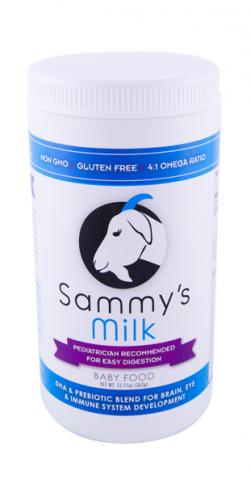FDA Investigates Sammy’s Milk Baby Food (Infant Formula) for Improper Manufacturing, Safety Concerns
September 30, 2016
- Fast Facts
- What is the problem and what is being done about it?
- What are the symptoms of Cronobacter infection?
- What are the symptoms of infant iron deficiency anemia?
- What specific products are recalled?
- Consumer Advice
Fast Facts
- The FDA advises consumers to not purchase or use Sammy’s Milk Baby Food (powdered infant formula) manufactured by Graceleigh, Inc. because this product has not been manufactured in compliance with infant formula regulations that serve a vital role in protecting the health of infants. Importantly, the product has not been tested for Cronobacter, a bacteria that can cause severe and sometimes fatal blood infections or meningitis in infants. The product also may not provide adequate nutritional levels of iron.
- If you fed your infant Sammy’s Milk Baby Food and think they are suffering from Cronobacter infection or iron deficiency anemia, contact a healthcare provider immediately.
- All Sammy’s Milk Baby Food is being recalled. This product is sold online and in California Mother’s Market & Kitchen retail stores.
What is the problem and what is being done about it?
The FDA is warning consumers not to purchase or use Sammy’s Milk Baby Food, a powdered infant formula. The agency is currently inspecting Graceleigh, Inc. (doing business as Sammy’s Milk) and has determined that the company does not produce its infant formula product, marketed as Sammy’s Milk Baby Food, in accordance with the federal regulatory standards. In particular, Sammy’s Milk Baby Food is not tested for Cronobacter, a bacteria that can cause severe and sometimes fatal infections in children. Infants are particularly susceptible to Cronobacter infection, which can cause sepsis (blood infection), meningtitis (an inflammation of the membranes that protect the brain and spine), or even death.
Sammy’s Milk Baby Food is also not testing for all of the 30 nutrients required to be in infant formulas, as required by the Federal Food, Drug and Cosmetic Act and FDA regulations, and may not provide adequate nutritional levels of iron. Sammy’s Milk Baby Food contains 0.2 mg of iron per serving (i.e., per 100 Calories or per 120 ml), which is equivalent to 1.67 mg of iron per liter, well below the iron content of 4 to 8 mg/L that formula-fed infants up to six months of age should receive. Infant formula products that contain less than 1 mg of iron per 100 Calories are required to include a statement on the label indicating that additional iron may be necessary. Inadequate intake of iron during infancy may lead to iron deficiency anemia which, if untreated, has irreversable cognitive and functional development outcomes. Low iron intake is of particular concern for infants who rely on the product as a sole source of nutrition.
Following discussions with the FDA, Sammy’s Milk issued a recall on September 30, 2016.
Sammy’s Milk Baby Food is sold online and in California Mother’s Market & Kitchen retail stores. Retailers should not sell this product.
The FDA does not approve infant formulas before they can be marketed. However, all formulas marketed in the United States must meet federal manufacturing and nutrient requirements. Infant formula manufacturers are required to register with FDA and provide the agency with a notification prior to marketing a new formula. View more information about how FDA regulates infant formula.
To date, no adverse events have been reported.
What are the symptoms of Cronobacter infection?
According to the Centers for Disease Control and Prevention, Cronobacter can cause several different kinds of infections, and symptoms vary with both the site of infection and the age of the patient. Infants are particularly susceptible to Cronobacter infection, which can cause sepsis, meningtitis, or even death.
In infants, Cronobacter illness generally starts with a fever. It usually includes poor feeding, crying, or very low energy. Some infants may also experience seizures. Those with meningitis may develop brain abscesses or infarcts, hydrocephalus, or other serious complications that can cause long-term neurological problems or death.
The mortality rate for Cronobacter meningitis is as high as 40%. More information can be found on CDC’s website.
What are the symptoms of infant iron deficiency anemia?
Infants with iron deficiency anemia may display paleness and/or weakness or may not show any symptoms at all. Iron deficiency anemia in infants is diagnosed by blood tests which show an abnormally low level of hemoglobin in the infant’s blood, and by other tests measuring iron status.
Inadequate intake of iron during infancy leading to iron deficiency anemia is a serious condition which, if left untreated, can impair an infant’s intellectual and motor development with effects extending into childhood, adolescence, and even adulthood.
What specific products are recalled?
This product comes in a 12.84oz white plastic container for all lot numbers with expiration dates of 11/2016 - 8/2018.
Consumer Advice
FDA advises consumers to not purchase or use Sammy’s Milk Baby Food (powdered infant formula) because this product has not been manufactured in compliance with infant formula regulations that serve a vital role in protecting the health of infants. Importantly, the product has not been tested for Cronobacter, a bacteria that can cause severe and sometimes fatal blood infections or meningitis in infants. FDA further advises consumers not to purchase or use Sammy’s Milk Baby Food because the product may not provide adequate levels of iron to meet recommended intakes, particularly for younger infants, which could lead to iron deficiency anemia.
If you fed your infant Sammy’s Milk Baby Food and think they are suffering from Cronobacter infection or iron deficiency anemia, contact a healthcare provider immediately.
You may also report illnesses or concerns to your local FDA consumer complaint coordinator. To find yours, visit Consumer Complaint Coordinators.
If you are unsure of your risk, ask your healthcare provider.

